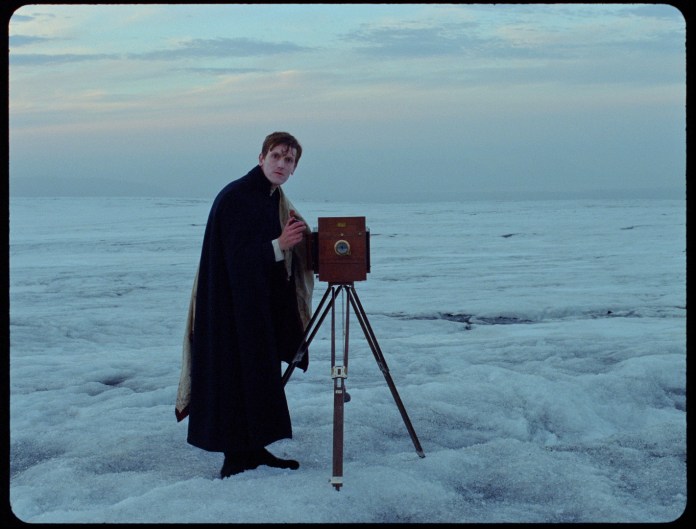Hylnur Pálmason’s impressive third feature is a bleak and beautiful look at one man’s mission to conquer a hostile and unforgiving land. Set in the late nineteenth century, this Icelandic saga (and it is a bit of a saga, coming in at 2 hours, 23 minutes) is a story of a young Danish priest Lucas (Crosset Hove) sent on a mission to conquer the hearts of the Icelandic people. He is to build a church and see that the natives attend it. But if cinema has taught us anything, we know that this task will inevitably end in failure. From The Mission to Silence, religious men and their hubris have been portrayed on the big screen, with Godland now joining their ranks. But if 143 minutes in the company of a granite-faced parson and a booming smoking volcano that smells ‘like the Earth has shat its pants’ doesn’t sound appetising, you would be missing out on a wonderful feast.
Godland has two titles: one in Danish and one in Icelandic. Both appear on the screen, one with a blue flag fluttering as a backdrop and the other with a red. Pálmason deals with the theme of language, misunderstanding and isolation – often hilariously – through the vicissitudes of Lucas as he stumbles across the harsh Icelandic terrain and through his language lessons with the interpreter (Hilmar Guðjónsson). Ragnar (Ingvar Sigurðsson), the guide, calls Lucas ‘a Danish devil’ and Lucas nods; an irascible farmer tells the priest ‘You look miserable’, and so on. Ragnar and Lucas are pitted against each other from the start, a man of the land versus a man of the cloth, and their relationship will only deteriorate as the story unfolds. The interpreter, with whom Lucas enjoys an intimate relationship and whose death is caused by the priest’s foolish stubbornness, tells him Icelandic has lots of expressions to say shut your mouth and to describe bad weather.
Alex Zhang Hungtai’s outstanding score emphasises the formidable journey – both physical and psychological – that lies ahead, the music laden with foreboding and in tune with the ‘terribly beautiful’ landscapes, beautifully shot by DP Maria von Hausswolffs (who worked with Pálmason on A White, White Day). Hausswolffs has chosen to film in a square Academy ratio that fits perfectly with a film whose protagonist has lugged a Daguerrotype camera across the rugged terrain and who frequently faffs about with his unwieldy equipment.
 After the arduous trek that has seen the death of the interpreter and the near demise of Lucas, Ragnar and his band finally reach civilisation, where the priest is nursed back to health. New characters appear: the Danish widower Carl (Jacob Hauberg Lohmann), and his two daughters, Anna (Vic Carmen Sonne) and Ida (Ída Mekkín Hlynsdóttir). Ida provides plenty of humour and for the viewer the relief and wonder of finally seeing warm interiors and creature comforts is almost palpable. Will this be the beginning of a thawing of Lucas’s cold heart? As Ida makes him finally crack a smile and Anna offers him the possibility of love, will this ‘Danish devil’ find peace amongst the hardy natives?
After the arduous trek that has seen the death of the interpreter and the near demise of Lucas, Ragnar and his band finally reach civilisation, where the priest is nursed back to health. New characters appear: the Danish widower Carl (Jacob Hauberg Lohmann), and his two daughters, Anna (Vic Carmen Sonne) and Ida (Ída Mekkín Hlynsdóttir). Ida provides plenty of humour and for the viewer the relief and wonder of finally seeing warm interiors and creature comforts is almost palpable. Will this be the beginning of a thawing of Lucas’s cold heart? As Ida makes him finally crack a smile and Anna offers him the possibility of love, will this ‘Danish devil’ find peace amongst the hardy natives?
Alas, no. As the men work on the church, a couple want to wed. Will Lucas wed them in the half-finished church? Not a chance. In the opening scene, Lucas was told by his superior to be flexible, yet it seems the young priest is unbending. He is completely out of tune with the people and the land.
It is a land that the director knows very well from his years growing up on the island. Pálmason captures the wonder of the country’s nature in virtually every scene, whether it’s an earthworm crawling across dung, a beetle scuttling across the wedding table or that volcano, like an ominous and booming Mordor, on the far horizon. And then there are the resilient Icelandic ponies and Ragnar’s fantastic dog (called ‘Dog’), who is such a good boy that even Lucas is charmed.
Sigurðsson is magnificent as Ragnar, a man who can seemingly put his hand to anything. He rides, fishes, is a fine storyteller and musician, a dab hand with a hammer, and an exemplary guide. And in his final scene, as he repeats the phrase ‘Pray for me’, his honour and his honesty shine through. As Lucas, Hove is as terrifying and harsh as the landscape, and his slide into madness is awful to behold. Both leads are supported by a wonderful cast. Pálmason has created a film that is as beautiful as it is intelligent. Don’t miss it.






